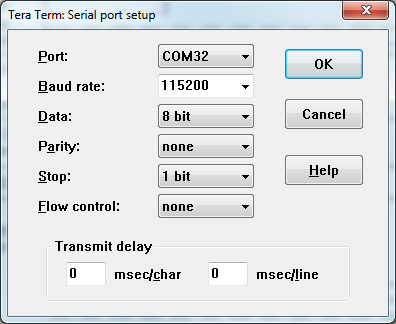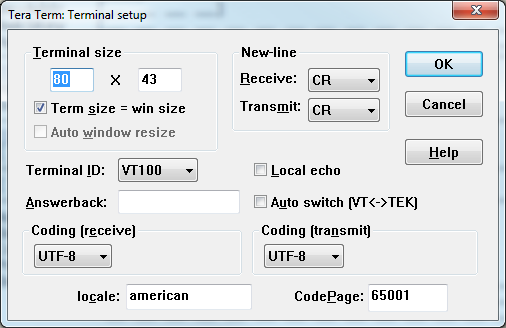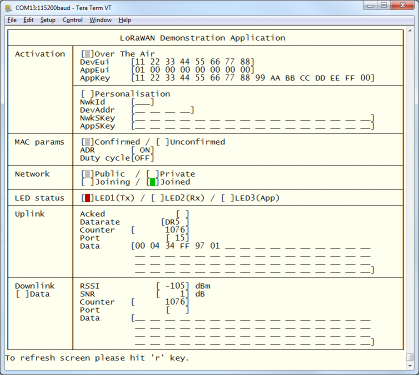Application example using LoRaWAN-lib MAC layer implementation
Dependencies: mbed LoRaWAN-lib SX1272Lib
LoRaWAN-demo is a ClassA device example project using LoRaWAN-lib and SX1272Lib libraries.
This demo application sends a frame every 4 to 6 seconds (randomly) and displays its current status using a serial port as display(VT100).
The serial port settings are as shown in below image. To access the serial port settings please click on "Setup" menu and then "Serial port..."

The terminal window should be setup as shown in below image. To access the terminal window settings please click on "Setup" menu and then "Terminal..."

The image below shows the VT100 application status.

The application gives the possibility to either activate the device using
- Over The Air Activation (OTAA)
- Personalization activation (PA)
The activation mode can be adjusted in Comissioning.h by changing the following parameter:
/*! * When set to 1 the application uses the Over-the-Air activation procedure * When set to 0 the application uses the Personalization activation procedure */ #define OVER_THE_AIR_ACTIVATION 1
The application gives the possibility to select which kind of network we are connecting to.
- Public Network (true)
- Private Network (false)
The netork type can be changed as follows:
/*! * Indicates if the end-device is to be connected to a private or public network */ #define LORAWAN_PUBLIC_NETWORK true
OTAA
When OTAA is selected the user must porvide a device EUI, an application EUI and an application key.
These can be adjusted by changing the following parameters:
/*!
* Mote device IEEE EUI (big endian)
*/
#define LORAWAN_DEVICE_EUI { 0x11, 0x22, 0x33, 0x44, 0x55, 0x66, 0x77, 0x88 }
/*!
* Application IEEE EUI (big endian)
*/
#define LORAWAN_APPLICATION_EUI { 0x00, 0x00, 0x00, 0x00, 0x00, 0x00, 0x00, 0x00 }
/*!
* AES encryption/decryption cipher application key
*/
#define LORAWAN_APPLICATION_KEY { 0x2B, 0x7E, 0x15, 0x16, 0x28, 0xAE, 0xD2, 0xA6, 0xAB, 0xF7, 0x15, 0x88, 0x09, 0xCF, 0x4F, 0x3C }
PA
When PA is selected the user must porvide a network ID, a device address, a network session key and an application session key.
These can be adjusted by changing the following parameters:
/*!
* Current network ID
*/
#define LORAWAN_NETWORK_ID ( uint32_t )0
/*!
* Device address on the network (big endian)
*/
#define LORAWAN_DEVICE_ADDRESS ( uint32_t )0x12345678
/*!
* AES encryption/decryption cipher network session key
*/
#define LORAWAN_NWKSKEY { 0x2B, 0x7E, 0x15, 0x16, 0x28, 0xAE, 0xD2, 0xA6, 0xAB, 0xF7, 0x15, 0x88, 0x09, 0xCF, 0x4F, 0x3C }
/*!
* AES encryption/decryption cipher application session key
*/
#define LORAWAN_APPSKEY { 0x2B, 0x7E, 0x15, 0x16, 0x28, 0xAE, 0xD2, 0xA6, 0xAB, 0xF7, 0x15, 0x88, 0x09, 0xCF, 0x4F, 0x3C }
On top of main.c the user has the possibility to tweak some application settings such as:
- Join requests transmission frequency
- Frames transmission frequency
- Application default datarate
- Confirmed or Unconfirmed frames transmission
- ADR (Adaptive Datarate) ON/OFF
- Application port to be used by the transmitted frames
The join requests transmission frequency can be adjusted by changing the follwoing parameter:
/*! * Join requests trials duty cycle. */ #define OVER_THE_AIR_ACTIVATION_DUTYCYCLE 10000000 // 10 [s] value in us
The frame transmission frequency can be adjusted by changing the follwoing parameters:
/*! * Defines the application data transmission duty cycle. 5s, value in [us]. */ #define APP_TX_DUTYCYCLE 5000000 /*! * Defines a random delay for application data transmission duty cycle. 1s, * value in [us]. */ #define APP_TX_DUTYCYCLE_RND 1000000
The frame transmission scheduling is then executed as follows:
if( ScheduleNextTx == true )
{
ScheduleNextTx = false;
// Schedule next packet transmission
TxDutyCycleTime = APP_TX_DUTYCYCLE + randr( -APP_TX_DUTYCYCLE_RND, APP_TX_DUTYCYCLE_RND );
TimerSetValue( &TxNextPacketTimer, TxDutyCycleTime );
TimerStart( &TxNextPacketTimer );
}
The application default datarate can be adjusted by changing the following parameter:
Quote:
When ADR is off this setting is the fixed datarate that will be used by the application.
When ADR is on this setting is the initial datarate used by the application.
/*! * Default mote datarate */ #define LORAWAN_DEFAULT_DATARATE DR_0
The transmitted frame contents will depend on LORAWAN_CONFIRMED_MSG_ON value.
/*! * LoRaWAN confirmed messages */ #define LORAWAN_CONFIRMED_MSG_ON true
- If LORAWAN_CONFIRMED_MSG_ON equals false then the application payload is one byte corresponding to the AppLed state.
- If LORAWAN_CONFIRMED_MSG_ON equals true then the application payload is six bytes corresponding to the AppLed state, Downlink counter (unsigned 16 bits), received RSSI (signed 16 bits) and received SNR (signed 8 bits).
/*!
* \brief Prepares the payload of the frame
*/
static void PrepareTxFrame( uint8_t port )
{
switch( port )
{
case 15:
{
AppData[0] = AppLedStateOn;
if( IsTxConfirmed == true )
{
AppData[1] = LoRaMacDownlinkStatus.DownlinkCounter >> 8;
AppData[2] = LoRaMacDownlinkStatus.DownlinkCounter;
AppData[3] = LoRaMacDownlinkStatus.Rssi >> 8;
AppData[4] = LoRaMacDownlinkStatus.Rssi;
AppData[5] = LoRaMacDownlinkStatus.Snr;
}
}
break;
case 224:
...
}
The ADR enabling/disabling can be adjusted by changing the following parameter:
/*! * LoRaWAN Adaptive Data Rate * * \remark Please note that when ADR is enabled the end-device should be static */ #define LORAWAN_ADR_ON 1
The application port can be adjusted by changing the following parameter:
/*! * LoRaWAN application port */ #define LORAWAN_APP_PORT 15
system/crypto/cmac.cpp
- Committer:
- mluis
- Date:
- 2016-01-07
- Revision:
- 0:45496a70a8a5
- Child:
- 3:3152aa75c58d
File content as of revision 0:45496a70a8a5:
/**************************************************************************
Copyright (C) 2009 Lander Casado, Philippas Tsigas
All rights reserved.
Permission is hereby granted, free of charge, to any person obtaining
a copy of this software and associated documentation files
(the "Software"), to deal with the Software without restriction, including
without limitation the rights to use, copy, modify, merge, publish,
distribute, sublicense, and/or sell copies of the Software, and to
permit persons to whom the Software is furnished to do so, subject to
the following conditions:
Redistributions of source code must retain the above copyright notice,
this list of conditions and the following disclaimers. Redistributions in
binary form must reproduce the above copyright notice, this list of
conditions and the following disclaimers in the documentation and/or
other materials provided with the distribution.
In no event shall the authors or copyright holders be liable for any special,
incidental, indirect or consequential damages of any kind, or any damages
whatsoever resulting from loss of use, data or profits, whether or not
advised of the possibility of damage, and on any theory of liability,
arising out of or in connection with the use or performance of this software.
THE SOFTWARE IS PROVIDED "AS IS", WITHOUT WARRANTY OF ANY KIND, EXPRESS
OR IMPLIED, INCLUDING BUT NOT LIMITED TO THE WARRANTIES OF MERCHANTABILITY,
FITNESS FOR A PARTICULAR PURPOSE AND NONINFRINGEMENT. IN NO EVENT SHALL THE
CONTRIBUTORS OR COPYRIGHT HOLDERS BE LIABLE FOR ANY CLAIM, DAMAGES OR OTHER
LIABILITY, WHETHER IN AN ACTION OF CONTRACT, TORT OR OTHERWISE, ARISING
FROM, OUT OF OR IN CONNECTION WITH THE SOFTWARE OR THE USE OR OTHER
DEALINGS WITH THE SOFTWARE
*****************************************************************************/
//#include <sys/param.h>
//#include <sys/systm.h>
#include <stdint.h>
#include "aes.h"
#include "cmac.h"
#include "utilities.h"
#define LSHIFT(v, r) do { \
int32_t i; \
for (i = 0; i < 15; i++) \
(r)[i] = (v)[i] << 1 | (v)[i + 1] >> 7; \
(r)[15] = (v)[15] << 1; \
} while (0)
#define XOR(v, r) do { \
int32_t i; \
for (i = 0; i < 16; i++) \
{ \
(r)[i] = (r)[i] ^ (v)[i]; \
} \
} while (0) \
void AES_CMAC_Init(AES_CMAC_CTX *ctx)
{
memset1(ctx->X, 0, sizeof ctx->X);
ctx->M_n = 0;
memset1(ctx->rijndael.ksch, '\0', 240);
}
void AES_CMAC_SetKey(AES_CMAC_CTX *ctx, const uint8_t key[AES_CMAC_KEY_LENGTH])
{
//rijndael_set_key_enc_only(&ctx->rijndael, key, 128);
aes_set_key( key, AES_CMAC_KEY_LENGTH, &ctx->rijndael);
}
void AES_CMAC_Update(AES_CMAC_CTX *ctx, const uint8_t *data, uint32_t len)
{
uint32_t mlen;
uint8_t in[16];
if (ctx->M_n > 0) {
mlen = MIN(16 - ctx->M_n, len);
memcpy1(ctx->M_last + ctx->M_n, data, mlen);
ctx->M_n += mlen;
if (ctx->M_n < 16 || len == mlen)
return;
XOR(ctx->M_last, ctx->X);
//rijndael_encrypt(&ctx->rijndael, ctx->X, ctx->X);
aes_encrypt( ctx->X, ctx->X, &ctx->rijndael);
data += mlen;
len -= mlen;
}
while (len > 16) { /* not last block */
XOR(data, ctx->X);
//rijndael_encrypt(&ctx->rijndael, ctx->X, ctx->X);
memcpy1(in, &ctx->X[0], 16); //Bestela ez du ondo iten
aes_encrypt( in, in, &ctx->rijndael);
memcpy1(&ctx->X[0], in, 16);
data += 16;
len -= 16;
}
/* potential last block, save it */
memcpy1(ctx->M_last, data, len);
ctx->M_n = len;
}
void AES_CMAC_Final(uint8_t digest[AES_CMAC_DIGEST_LENGTH], AES_CMAC_CTX *ctx)
{
uint8_t K[16];
uint8_t in[16];
/* generate subkey K1 */
memset1(K, '\0', 16);
//rijndael_encrypt(&ctx->rijndael, K, K);
aes_encrypt( K, K, &ctx->rijndael);
if (K[0] & 0x80) {
LSHIFT(K, K);
K[15] ^= 0x87;
} else
LSHIFT(K, K);
if (ctx->M_n == 16) {
/* last block was a complete block */
XOR(K, ctx->M_last);
} else {
/* generate subkey K2 */
if (K[0] & 0x80) {
LSHIFT(K, K);
K[15] ^= 0x87;
} else
LSHIFT(K, K);
/* padding(M_last) */
ctx->M_last[ctx->M_n] = 0x80;
while (++ctx->M_n < 16)
ctx->M_last[ctx->M_n] = 0;
XOR(K, ctx->M_last);
}
XOR(ctx->M_last, ctx->X);
//rijndael_encrypt(&ctx->rijndael, ctx->X, digest);
memcpy1(in, &ctx->X[0], 16); //Bestela ez du ondo iten
aes_encrypt(in, digest, &ctx->rijndael);
memset1(K, 0, sizeof K);
}
 SX1272MB2xAS / SX1272MB2DAS
SX1272MB2xAS / SX1272MB2DAS